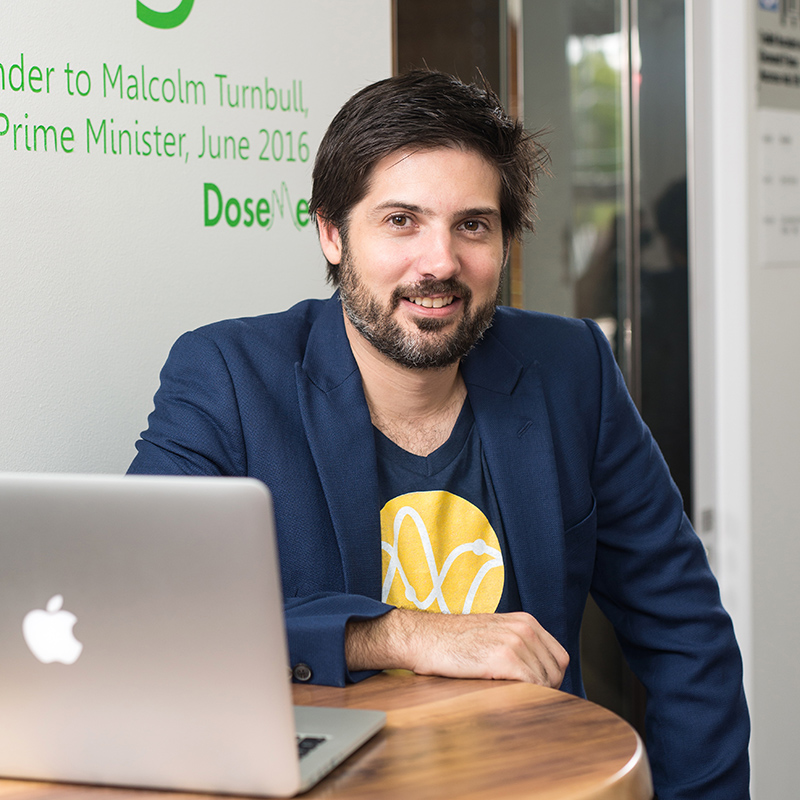Dr Robert McLeay led software development teams that were delivering complex projects for hundreds of thousands of users before completing a PhD in Bioinformatics, using computational techniques to model and understand genetic and biological data.
Like many breakthrough inventions, serendipity played a role in the creation of Robert’s DoseMeRx software and startup company a few years later.
An acquaintance at a barbecue made a passing remark about the effort pharmaceutical companies spend in optimising dosing across a large group of patients in clinical trial cohorts, ensuring that the hundreds of millions of dollars spent on these trials is not wasted. He asked, “Why don’t we apply these techniques to predict optimal medication dosages for individual patients in normal clinical practice?”
Robert was inspired to create a tool that helped doctors and pharmacists calculate the correct amount of medication for each patient. He founded DoseMe in April 2014 after two years of prototype development. His interest in combining modelling biological data with his background in IT led to safer and more effective precision-dosing of patient medications.
Precision-dosing has been independently proven to improve patient outcomes (even halving mortality in some groups) and lower healthcare costs. Through deploying DoseMeRx, hospitals have been able to demonstrate reducing the incidence of antibiotic-associated acute kidney injury by 83%.
DoseMe’s easy-to-use software, DoseMeRx was designed from the beginning for clinicians rather than researchers. Making these complex algorithms available within a simple, app-based user interface now allows clinicians access to the DoseMe platform anytime, anywhere. DoseMeRx became first application integrated and available within the most commonly-used electronic healthcare record systems globally, Cerner and Epic – making the benefits of machine learning available within normal clinical workflow.
Robert focused on ensuring that the software had a rigorous scientific basis assuming scientific leadership within the company. He assumed responsibility for DoseMeRx’s validation and regulatory clearance in Australia, Europe, and the USA.
The software platform was built on the principles of Bayesian dose forecasting. This method uses thousands of data points from published population models and uses a complex mathematical algorithm to integrate individual patient data and laboratory results – modelling their individual ability to absorb, process and clear a drug from their system.
Once this virtual model of each individual is built – in less than a second – DoseMe helps clinicians dose more accurately and precisely, calculating the most effective dose to reach the desired outcome. DoseMe can also simulate the potential outcome of different dosing regimens to support clinicians in making the best decision for challenging cases.
Today, DoseMeRx enables individualised dosing in hundreds of hospitals across 10 countries. DoseMe currently supports over 7,000 clinician users, supports 42 drug models ranging from antibiotics to transplant medicines to chemotherapy, and to date has calculated over 1.4 million medication doses.
As a scientist, Robert applied modelling and bioinformatics to a range of fields and published 13 peer-reviewed articles in genomic data analysis, developmental biology, glioblastoma, and schizophrenia research.
As an entrepreneur and innovator, he attracted $500,000 seed funding from high profile investor tech Steve Baxter in 2014, followed by $2.6 million to underpin DoseMe’s continued growth in a Series A round that valued the company at $20 million.
Fewer than five years after its launch, US-based Tabula Rasa HealthCare acquired DoseMe for US$30 million. Robert moved on to the next stage of his career – completing his qualification as a Doctor of Medicine at UQ.
Robert’s deep background in medical research and experience with medtech start-ups benefits his contribution to the advisory of board at Atidia, a company commercialising clinical decision support software that uses machine learning to improve peri-operative and surgical care. He continues to support other early-stage startups around Australia.
Drive lifesaving discoveries with us

Dr Robert McLeay
IMB
PhD Student 2008 – 2011
Now
Medical student, UQ
